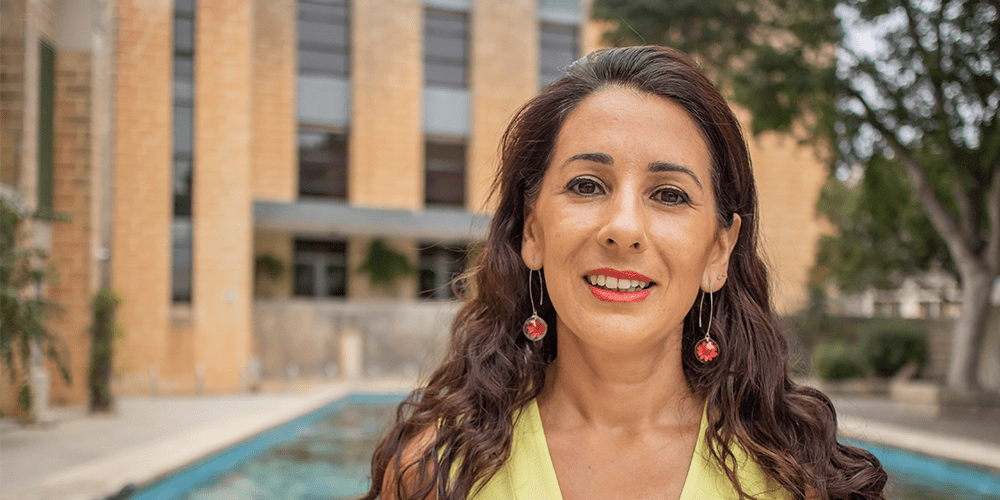From drama groups to their own committee, people with intellectual disabilities are finding their voice to reject overprotection and prejudice as they pursue relationships. Researchers at the University of Malta (UM) are supporting them with evidence. Words by Daiva Repeckaite.
‘I’d like to have a family if that is the case, maybe have a family of my own, get married if that is the case. Just live a simple normal life like other persons do,’ Katrina (not her real name), who lives with an intellectual disability, told researchers. This longing — for being cared for, supported, and included in the community — is not only an aspiration for people with intellectual disabilities. It is their right. Still, research in Malta reveals that being in a romantic relationship is an elusive dream for many young Maltese who live with an intellectual disability.
When Dr Claire Azzopardi Lane (head of the Department of Disability Studies at the UM) interviewed nine individuals aged 18–35 with intellectual disabilities living with their families in Malta, she found two who were involved in a romantic relationship. Their experience was very different from the rather isolated, overprotected world of most persons who share the same fate. ‘Two participants in a relationship quoted in the article have supportive parents, who didn’t want them to be alone for the rest of their lives. They would drive them or they would pick them up if they go for a date. They give them a safe space where [they can] be with their partner. They are worried about [risks] and rightly so, but they’re navigating it in the right way,’ she explains.

Thou shalt not love
The situation is not the same for everyone. Azzopardi Lane and other researchers have observed that many individuals are discouraged rather than supported when they seek romance. Persons with intellectual disability are increasingly making their voices heard through theatre, sport, youth organisations, and the Commission for the Rights of Persons with Disability (CRPD), which convenes a Consultative Committee of People with Intellectual Disability. Yet their struggle for independence often hits a very soft and gentle barrier — the boundaries of their own home, and the attitudes of their families.
Mencap, a UK charity that supports people with intellectual disabilities, publishes extensively about romance and sexuality. In the organisation’s view, romantic relationships offer fulfilment, reduce loneliness, and even help reduce health risks. On the other hand, predominant attitudes in Malta are far more conservative. ‘Parents might refuse to send [teenagers with learning disabilities] to sex-ed programmes; some believe that it’s better if they don’t know this,’ Azzopardi Lane, who trains staff working with this group, observes. ‘I’ve trained family members, who are about 25–45 years old, and one of them told me, “it’s like chocolate, if you never tasted it, you won’t know what you’re missing.”’
‘Our parents love us, but when they do overprotection it is bad.’
‘The biggest challenge is an extreme lack of opportunities for persons with disabilities to explore, in a healthy manner, their own relationships with others. This could be because of overprotectiveness from the parents and a lack of financial independence,’ Aġenzija Sapport, a national authority that supports and empowers people with disabilities, acknowledged when asked about the challenges faced by their current and potential clients as they pursue relationships. In her paper titled ‘Muted Voices’, Azzopardi Lane emphasises the suppression of individuals’ desires and aspirations in a society where the Church still exerts a powerful influence. Her interviewees reported feeling overprotected and dependent on their parents’ transport and money to enjoy their social lives. ‘Participants […] did not wish to live the rest of their life cared for by their families. However, they were even more appalled by the possibility of having to live in an institution.’ These establishments offer very different living arrangements for individuals, but none for couples.
‘Our parents love us, but when they do [sic] overprotection it is bad,’ observes Isabel Bonello in an article on overprotection, based on an inclusive study she initiated at the Department of Disability Studies. Living with intellectual disability herself, she led focus groups of people affected by this, assisted by Dr Anne-Marie Callus. Research participants stated that, while they appreciated their parents’ good intentions, they were tired of living their lives as if wrapped in cotton. Some did not own a mobile phone, were not taught to use public transport, or given pocket money. Student Michael Debattista’s research (supervised by Azzopardi Lane) shows how overprotection stems from good intentions, but leads to a frustrating situation for young people: ‘parental over-protection is an unconscious process, which stems from the assumption that people with disability “need protection”.’
Independence denied
In a paper Azzopardi Lane and Callus wrote together, they state that one of the barriers people with intellectual disabilities face is the denial of their sexual maturity. Whatever their age or knowledge, they are perceived as ‘perpetual children’. Callus convened a workshop of young people with disabilities in July, and the participants agreed that she conveys their thoughts to THINK. They pointed out how overprotection affects Maltese youth without disabilities as well. Yet when disability comes into the picture, young people are ‘perceived as more fragile, […] and it tends to last much longer than it does for non-disabled adults.’ Families do not trust these individuals’ abilities, and fear ‘being labelled as neglectful for promoting independent living to their children with disability.’
Romance while living with an intellectual disability is still a taboo that extends even to groups generally sympathetic to disability causes. Having reviewed academic literature, Debattista found that most people view those with disabilities as ‘incomplete’ and ‘undesirable’ because of idealised physical norms. Even his own research participants with physical or sensory disabilities felt strongly against dating persons with intellectual disabilities or mental health conditions. ‘Although I am a person with [sic] physical disability, [my partner] would not stay with me 24 hours a day, but with such people you need to stay 24 hours with them,’ one thought. Monika Parchomiuk found a similar hierarchy of disability in the attitudes of Polish students despite the fact that these students were preparing to enter occupations like nursing, that would ultimately serve persons with disabilities.
It’s like chocolate, if you never tasted it, you won’t know what you’re missing.
Even when individuals with intellectual disabilities successfully prove their independence, they hit another cultural barrier. ‘Then there is this idea that persons with an intellectual disability are not meant to have intimate relationships because they may not have the capacity to consent and be able to understand the responsibilities of marriage. Malta is generally Roman Catholic, and in Roman Catholic beliefs sex is meant to happen within marriage and is for procreation, not pleasure,’ Azzopardi Lane observes. ‘Sometimes [values are] used as an excuse to deter them.’ Furthermore, parents find it very difficult to accept sexual expression and intimacy needs that are not heterosexual, or gender identity that is not cisgender.
Non-standard sexual expression does not match the view that people with intellectual disabilities are innocent and angelic. ‘Do they find people attractive?’ ‘Do they kiss people?’ – these were some of the insensitive questions Debattista’s research participant, who works in a residential home, heard from outsiders. In reality, ‘persons with disability have sexuality, and they are exploring and expressing it, which is something normal and natural,’ says Azzopardi Lane.
One size doesn’t fit all
Yet her research shows that conservative values hold this group back. Dependent on their families to socialise, excluded from teenagers’ social circles, youth with disabilities lack alternative channels to meet and learn from other young people. ‘One of the biggest concerns is that persons with intellectual disabilities prefer to socialise with other peers with intellectual disabilities. This minimises the possibility of having people with intellectual disabilities get into an inter-able relationship. Is it because they do not feel welcome by non-disabled peers?’ asks Commissioner for the Rights of Persons with Disability Oliver Scicluna. Lack of experience may lead to idealistic notions of love and family, as well as a lack of age-appropriate and up-to-date vocabulary to discuss their needs and experiences. Researchers observed participants using words like ‘making babies’ to discuss sexual intercourse.
Researchers attribute these attitudes to a lack of tailor-made education on sexuality and intimacy. This can result in socially inappropriate behaviour, such as touching one’s genitals in public, which others then use to stigmatise people with intellectual disabilities and further deny their independence. Instead, people with intellectual disabilities need education with a lifelong approach. It may require repetition, a slower pace, and adequate resources — including visuals specifically produced for their needs. ‘You can’t expect a person with an intellectual disability to be told something when they are 15 and to remember it when they are 25. They may not be literate, they may not have access to the Internet. What they know is what other people tell them or what they experience,’ says Azzopardi Lane.
Access to education is shifting. According to Aġenzija Sapport, its clients have expressed a wish to know more about these topics. Multi-disciplinary teams of professionals hold sessions for the agency’s clients —Azzopardi Lane is involved in providing groups of these professionals, as well as parents and siblings, with evidence-based insights. The Agency’s outings within its Sharing Lives programme, as well as participation in youth organisations and Special Olympics, give young people with intellectual disabilities an opportunity for unsupervised leisure, which helps them meet new people and combat loneliness. Recently, Arts Council Malta and the CRPD ran a theatre project titled I Am Sex-Able for people with intellectual disabilities to express their sexuality.
Treat us as equals
More inclusive policies are in the works. Scicluna mentions the Personal Autonomy Act (currently being drafted with the support of CRPD), which should empower disabled people to receive the necessary support and guidance. Azzopardi Lane argues that it is time to shed the idea that disability is a tragedy and our drive to respond with charity. ‘[When] we represent them as childlike, needy, always asking for money, that reflects on society. It downgrades them.’
In preparation for an upcoming conference by CRPD in collaboration with the Department of Disability Studies, participants at the workshop on overprotection argued for being accepted for their own merit and individuality, for being respected, not pitied, and having privacy. Their voice, just like the title of the conference, says loud and clear – Protect and Let Go.
Further reading:
Azzopardi Lane, C.L., Cambridge, P., & Murphy, G. (2019). ‘Muted voices: The unexplored sexuality of young persons with learning disability in Malta’. British Journal of Learning Disabilities,00:1–9.
Callus, A.M., Bonello, I., Mifsud, C. & Fenech, R. (2019). ‘Overprotection in the lives of people with intellectual disability in Malta: knowing what is control and what is enabling support’. Disability & Society 34(3): 345-367.
Michael Debattista. Persons with Disability and Intimate Relationships: Realities in the Maltese Context. Master of Arts dissertation in Disability Studies, University of Malta, 2015.





Comments are closed for this article!